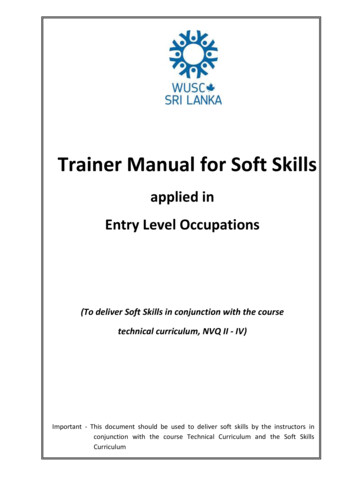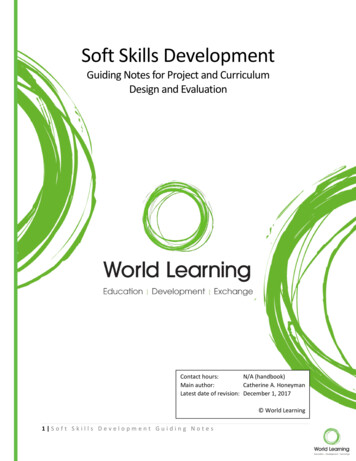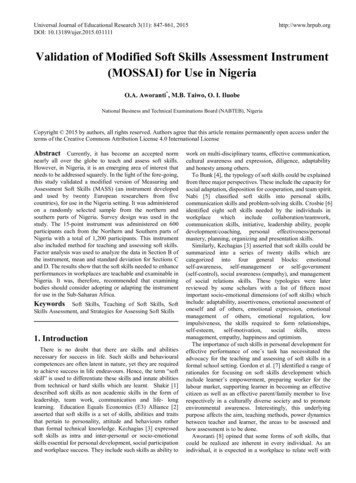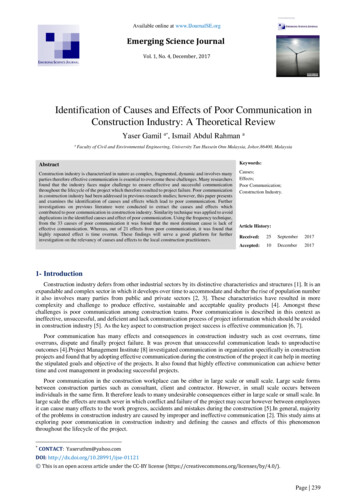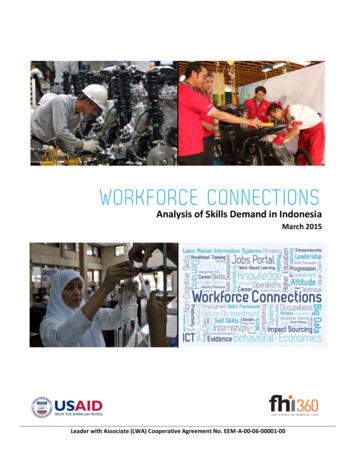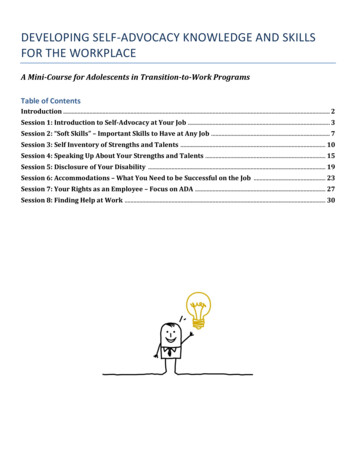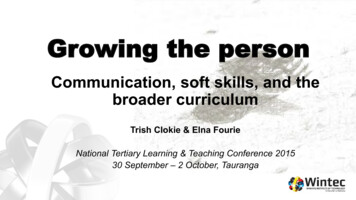
Transcription
Growing the personCommunication, soft skills, and thebroader curriculumTrish Clokie & Elna FourieNational Tertiary Learning & Teaching Conference 201530 September – 2 October, Tauranga
Context / Research Background Media Arts and Centre for Business, IT, and Enterprise, at Wintec 2014 – employer expectations of communication skills of graduates 2015 - educational perspectives of communication skills ofgraduates
ACCI (2002)Bennett (2006)Careers NZ (2013)Davies, Gore, Shury,Graduate CareersAustralia (2013)Vivian, Winterbotham,& Constable (2012)VUW (2006)Word collage created on Wordle - http://www.wordle.net/
Communication as part of the‘employability’ landscape Employers are looking for attributes along with, or as part of,communication skills. Notion of pre-competence and threshold competence(Jackson,2009)
Snapshot of employer survey Our findings were consistent with broader international research onemployability skills and communication – much focus on interpersonalskills, teamwork, written communication, and also personal attributes. Communication learning outcomes included in our courses weregenerally consistent with employers’ expectations. BUT employers still found communication skills of graduates wanting &identified issues with adapting to professional contexts.
Snapshot of tutor survey – so far Mostly consistent with employers’ thoughts– High ratings for all skills, but highest for interpersonal– Also rate personal attributes like motivation highly– Rate presentation skills higher than employers, spelling slightly lower Many mention the importance of adaptability to professionalcontext
Issues for teachinglanguage morphingdelivery styleauthenticityscaffoldingflexibility
So How should communication competency be taught and does itinclude broader competencies and attributes beyond basiccommunication skills? Should communication skills be embedded or taught as standalone courses? How might it be woven into discipline-specific learning?
Results so far But, when reading comments embed53%standalone47%- 22% respondents favour stand-alone- 28% advocate BOTH- BOTH categorised two ways:-stand-alone embeddedintegrated- Embedded either in-class, or work-based
Models / Methods for unicationskillsEmbedIntegrateWorkbasedExpressed aspart of, orapplied to,subject-specificcontentSubstantialintegrationof communication skills assubject contentCommunicationskills asinterpretedwithin aprofessionalcontext
Your thoughts?Applied to ‘teamwork’PlusMinusInteresting
What else?Other models?Other examples?
What needs to happen?Best practice for your discipline?Questions to be answered for effective approaches?Academic /Institutional / Professional
A proposed frameworkUniversity of Western Australia – Communication Skills Framework (2009)http://www.uwa.edu.au/ data/assets/pdf y-Report.pdf- Incorporated into a major or covered separately- “explicit focus” on communication- develop skills progressively across levels- content, pedagogy, and assessment- taught by or in consultation with specialists- integrated into professional and subject-specific content
A post-it for yourthoughts
References Andrews, J. & Higson, H. (2008). Graduate Employability, ‘soft Skills’ Versus ‘Hard’ Business Knowledge: A European Study.Higher Education in Europe, 33(4), 411 -422. doi:10. 1080/03797720802522627 Australian Chamber of Commerce and Industry. (2002). Employability Skills – An Employer Perspective. Retrieved loyability%20survey.pdf Bennett, R. (2002). Employers’ Demands for Personal Transferable Skills in Graduates: a content analysis of 1000 jobadvertisements and an associated empirical study. Journal of Vocational Education and Training, 54(4). Retrieved 36820200200209 Careers New Zealand (2014). Skills Employers are Looking For [Web Page]. Retrieved from e-what-to-do/skills-employers-are-looking-for/ Davies, B., Gore, K., Vivian, D., Winterbotham, M. & Constable, S. (2012, May). UK Commission’s Employer Skills Survey 2011:UK Results. UK Commission for Employemnt and Skills. Retrieved ications/ukces-employer-skills-survey-11.pdf Graduate Careers Australia. (2013). Graduate Outlook 2012. The Report of the Graduate Outlook Survey: Employers’perspectives on graduate recruitment. Retrieved from s/2011/12/GOS12 Report FINAL1.pdf Jackson, D. (2009). An international profile of industry-relevant competencies and skill gaps in modern graduates. InternationalJournal of Management Education 8 (3), 29-58. Retrieved ts/publications/ijme/Vol8no3/3IJME288.pdf
Jones, C. G. (2011, September). Written and Computer-mediated Accounting Communication Skills: An EmployerPerspective. Business Communication Quarterly, 74(3). Hager, P., Holland, S., & Beckett, D. (2002). Enhancing the learning and employability of graduates: the role of generic skills.Retrieved from http://www.bhert.com/position-papers.html Mitchell, G. W., Skinner, L. B., & White, B. J. (2010). Essential Soft Skills For Success In The Twenty-First Century WorkforceAs Perceived By Business Educators. Delta Pi Epsilon Journal, 52(1), 43-53. Retrieved fromhttp://www.dpe.org/publications.htm Payne, H. J. (2004). Reconceptualizing social skills in organizations: Exploring the relationship between communicationcompetence, job performance, and supervisory roles. Journal of Leadership & Organizational Studies, 11(2), 63-77.Retrieved from http://jlo.sagepub.com/ Robles, M, M. (2012, October 8). Executive Perceptions of the Top 10 Soft Skills Needed in Today’s Workplace. Businessand Professional Communication Quarterly December 2012, 75(4), 453-465. doi: 10.1177/1080569912460400 Sharp, M. R., & Brumberger, E. R. (2013, March). Business Communication Curricula Today: Revisiting the Top 50Undergraduate Business Schools. Business Communication Quarterly, 76(1), 5 – 27. VIC Careers. (2006, December). Employment Skills Survey. Victoria University of Wellington. Retrieved fromhttp://www.victoria.ac.nz/st services/careers/resources/employment skills 2006.pdf
employability skills and communication -much focus on interpersonal skills, teamwork, written communication, and also personal attributes. Communication learning outcomes included in our courses were generally consistent with employers' expectations. BUTemployers still found communication skills of graduates wanting &

